🎮 Terranova
2023年 10月 09日
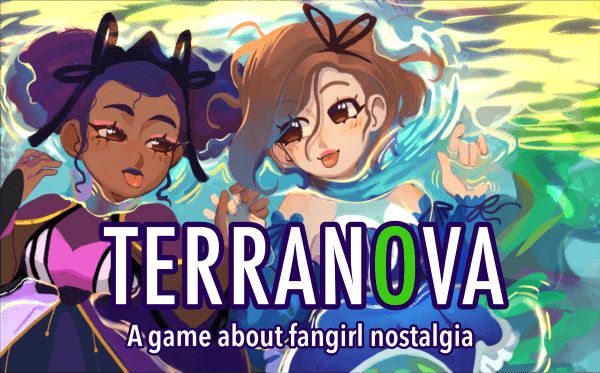
Talking about the experience of playing Terranova is frankly impossible without dredging up a lot of embarrassing memories of being a teenager on the early Internet. Saying that I relate to the characters would mean admitting that I was sometimes thoughtless, overly sincere, and, yes: cringe. I too remember what it is like to pour myself a little too much into my writing, yet not have the words to describe my own queerness. I understand the world of Terranova so much that playing got genuinely painful at points. And I say all of this as a good thing!
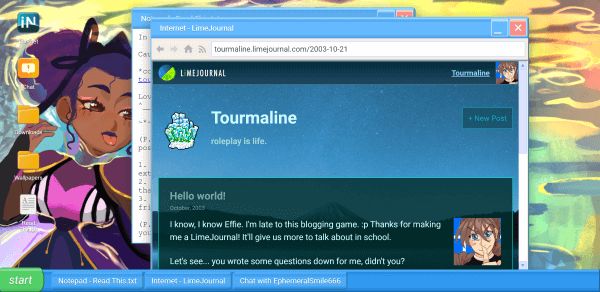
This game nails that early-2000s aesthetic, right down to the way everyone ends their sentences with :P
Let’s back up a bit. Terranova by Studio Terranova is an interactive fiction game told through the language of online chats and blog posts. You play as Tourmaline, a high school girl who loves writing, anime, and fanfiction. Together with your best friend from school, Effie, you create the post-apocalyptic setting of Terranova. You are later joined by Sendaria and Cherry, and the four of you role-play (RP) as characters and build out the world. Along the way, you experience the highs and lows of online friendship, romance, and teenage angst. All this plays out in that very specific early-2000s, Web 1.0 era when AIM and LiveJournal communities were still how you connected with others.
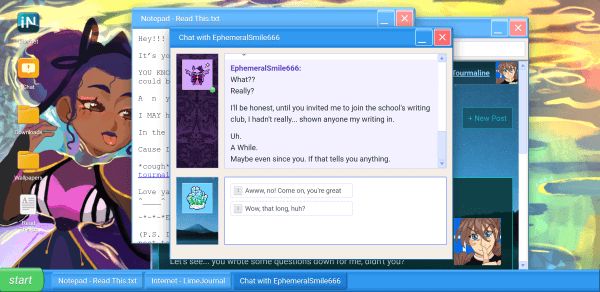
The characters in this game have real history and experiences outside of their computers, and you can see glimpses of that through their IM exchanges.
I spent most of my time in Terranova reading and “typing” AIM chats with my friends. (You do not actually type, but instead hold down the button to auto-fill in the message.) There are occasionally choices you can make to affect what you say, but the character of Tourmaline is still distinct from the player. Chats switch between “real life” talk as Tourmaline, to your RP as the playful assassin Eytan in the world of Terranova. Between chat sessions, you also update your personal blog and the Terranova group blog, and check your RSS feed for updates your friends made while you were away. Once you have exhausted all available options, you can skip ahead in time to the next chapter of the story. Through this loosely episodic structure, you can watch all four characters grow and interact over the course of 2004.
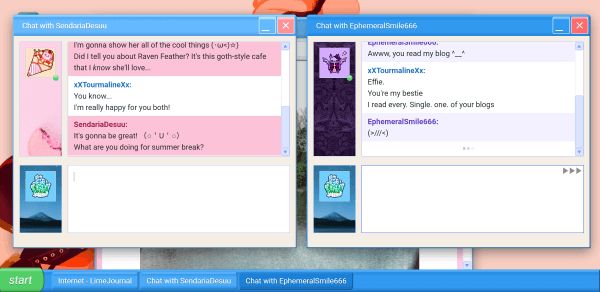
I cannot say enough about how authentic this UI is, and how it works so well to really pull you back into those old Windows XP days.
The writing for all four characters is distinct and rich, and our chat logs read like the ones I used to have with my real-life friends. Effie is creative and sensitive; Sendaria is bubbly but hints at darker issues in her life; and Cherry is both strong-willed yet emotionally vulnerable. Tourmaline can be insensitive and sticks her foot in it sometimes, but cares a lot for her friends. All four characters are likeable but flawed, and they mess up the same way you would expect from real teenagers as they are figuring out their own identities.
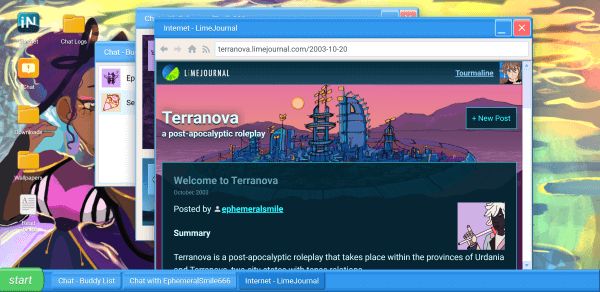
You will be spending a lot of your time role-playing in Terranova, the game-within-the-game world created by the four girls.
During RP sessions, they act out their original characters (OCs) like parts in an unscripted play, creating huge world-altering plotlines on the spot. All four OCs are built up through their interactions with each other, in the same meta way the game does for the four “real life” girls. The chat transcriptions of their RP sessions get written out as blog entries that go up on the Terranova group blog. If you have never done an RP blog before, this is a great example of how this kind of collaborative storytelling worked on the early web.
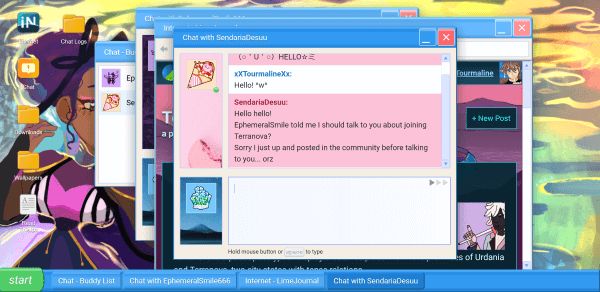
Navigating through delicate social situations as a teenage girl can be fraught at the best of times, but doing so online brings a completely different set of rules and etiquette.
Sometimes when I heard the ding of a new in-game message, it perked me up the way a modern-day Discord or LINE message from a friend would. Scrolling through the in-game RSS feed and seeing incomplete snapshots of the characters’ lives brought a surprising intimacy to the game. I do not want to spoil too much of the story here, but one character openly wonders if they are capable of being loved despite being ambivalent about romance. Talking with this character was heartbreaking at times because of how much I (and Tourmaline) wanted to help her, but could not. I cannot think of many other games I have played in my life that put me so completely in that mental space. I signed off most sessions of Terranova feeling drained, the way I do in real life situations when I feel helpless to solve any of my friends’ problems. Tourmaline, and I, needed to learn that we cannot always solve everything. It was a hard pill for me to swallow, then and now.
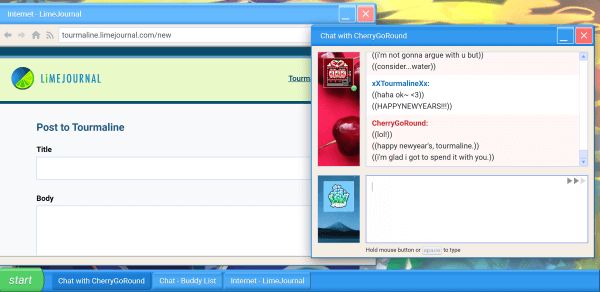
Spending time with your friends can lead to some really touching moments.
I mentioned at the top of this post that playing this game brought out some shameful memories. The reason for this is because Terranova was made pretty much explicitly for weirdos like me. I absolutely was that kid who made a LiveJournal account to post teenage angst online. I was that kid who spent too many late nights on AIM and IRC role-playing as some anime bishounen. I was even that kid who RPed steamy BL scenes, and my “haha, I am so gay” jokes in chat eventually turned into earnest “maybe I… am gay” revelations. Terranova pulls no punches, and it will dredge up all those memories from high school that you hoped to forget. The characters screw up, they hurt each other, they do not always make the best choices. Part of growing up is having to survive the gauntlet of your own youthful mistakes. If Eytan is a reflection of Tourmaline, so too is Tourmaline a mirror reflecting my own awkward high school years back to me.
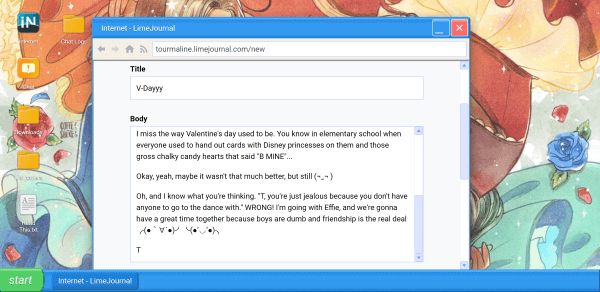
"Boys are dumb and friendship is the real deal!"
I don’t know how this game plays for anyone who did not live through that exact intersection of dial-up Internet, GeoCities pages with too many animated GIFs, and grainy VHS fansubs of Utena. But if you were there, then you will know that this game absolutely nails it. The UI and presentation of this game is a perfect time capsule of that exact point in time. I don’t know if there are any plans for a follow-up, but I personally am hungry for more. There is an upcoming Japanese version of the game, and I cannot wait for that to come out so I can recommend it to even more people and swap stories of our teenage years. Please check it out if you can!
